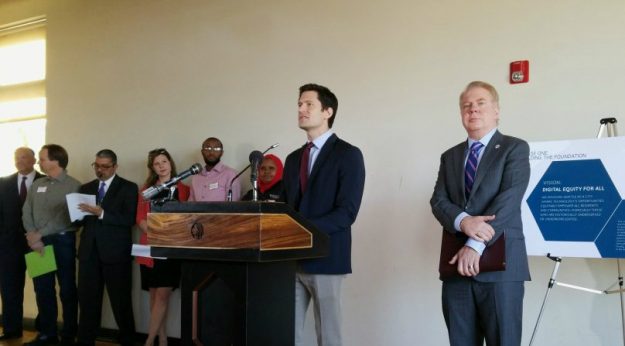Seattle sets concrete steps to bridge digital divide with new action plan

Seattle leaders now have a concrete plan for shrinking the city’s digital divide over the next years.
Mayor Ed Murray and Chief Technology Officer Michael Mattmiller unveiled Seattle’s new “Digital Equity Initiative Action Plan” Wednesday, laying out specific steps for the city to take through 2019 to get more of its low-income residents online.
The plan, which leaders worked to develop over the last year, highlights three broad efforts the city can undertake to build digital equity: improving access to devices and technical support, making free and low-cost Internet service more available, and building digital skills through training programs.
Each one of those efforts comes with detailed steps the city hopes to take to realize those goals, and Mattmiller told StateScoop that the plan contains those kinds of specific milestones to help the government stay answerable to the people it’s working to get connected.
“It is to help hold us accountable and give us a roadmap for when we need to be embarking on certain activities, but it’s also a way to signal to our community stakeholders when we’re going to be ready to engage them,” Mattmiller said. “As they think about the work they’re doing in the community, they can have a sense of when we’re going to be ready to assist them.”
Indeed, Mattmiller noted that the city worked to include ordinary people in the process of developing the plan as much as possible. While his Department of Innovation and Technology played a role in guiding the drafting of the plan, Mattmiller pointed out that the city made a concerted effort to meet with “more than a hundred individuals, community leaders, faith leaders and corporate representatives” to craft the document.
“It’s going to be those types of partnerships that help us get more people access to the Internet, to make sure that individuals are trained on the latest technology and can use the Internet to improve their lives,” Mattmiller said.
Mattmiller stresses that none of the city’s three overarching goals would be possible without help from the community itself. While Seattle does allocate $1.6 million each year for its digital inclusion efforts, Mattmiller noted that amount is amplified by the efforts of the private sector and nonprofits working on the issue as well.
“We can leverage the investments already being made and dollars being spent to a broader effect,” Mattmiller said.
[Read more: Seattle Police hope to engage community around open data]
The city’s push to expand Internet connectivity is a key example of the importance of outside partnerships, Mattmiller said. The plan calls for the city to make free Wi-Fi available at more public places, like city libraries and community centers, and Google and Comcast are both pitching in for that push.
Google will chip in $344,000 in grants for the city to expand free Wi-Fi service in the city’s public housing and 26 of its community centers. Similarly, Comcast is expanding its program to offer Internet service at a reduced cost for low-income residents for all families living in public housing.
“We’re trying to push Internet access as close as possible to individuals where they live,” Mattmiller said. “If it can’t be in the home itself, it’s getting to the neighborhood community center or making Wi-Fi publicly available in a corridor or a transit center where an individual is likely to be able to experience it.”
But Mattmiller added that the city’s efforts to expand the availability of the Internet won’t be nearly as effective in building equity if they aren’t accompanied by a robust digital education push. That’s why they decided to make digital skills training a focal point of the plan, including initiatives to bring STEM, coding and digital literacy programs to schools and community centers.
“Some households may not even understand why you need Internet access,” Mattmiller said. “For those who are new to this country or who grew up in generations where they didn’t have access to technology, to suddenly say you need this thing called the Internet or your children won’t be able to succeed is a very difficult concept.”
Mattmiller noted that local nonprofits or other community organizations can play a huge role in supporting those education efforts, and the city will continue to support those groups with its “Technology Matching Fund” grant program, which will accept applications through May from organizations vying for awards as large as $30,000.
“Criteria for those grants have varied from year to year, but going forward, we’re going to align those criteria with the types of strategies that we’ve focused on in the action plan,” Mattmiller said. “That’s one way we’ll amplify our effort and really help our community organizations drive the work that gets done.”
But beyond the city’s specific efforts, Mattmiller hopes that the process of crafting the plan helps spark an ongoing conversation about the issue in Seattle.
“It was really great to see so many people come together and talk about how to close the digital divide in our city,” Mattmiller said.
Contact the reporter at alex.koma@statescoop.com, and follow him on Twitter @AlexKomaSNG.






